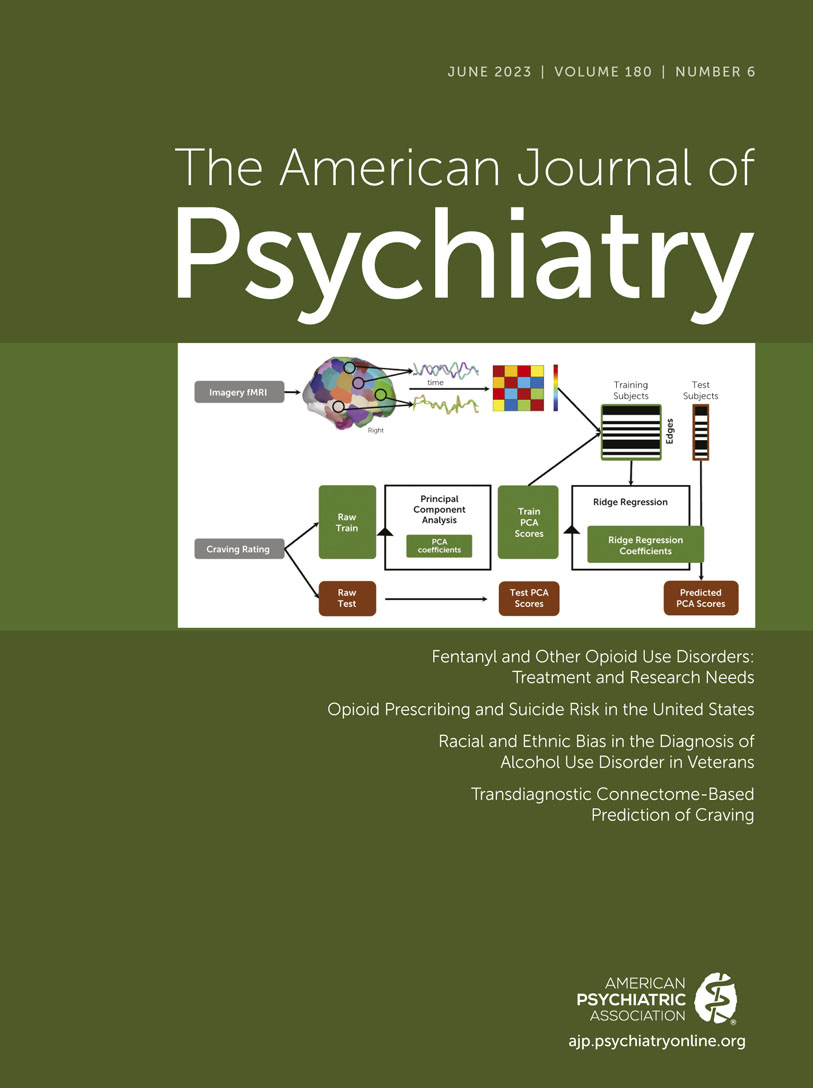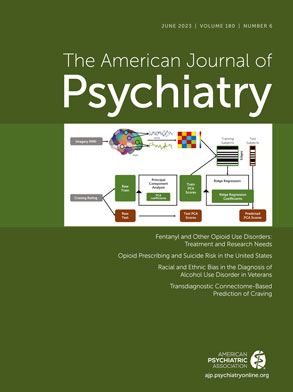Psychiatrists and other medical professionals use diagnostic nomenclature to communicate information about the mental health needs of patients and to make critical decisions regarding treatment. An accurate and precise diagnosis can help patients access appropriate treatments and avoid contraindicated or potentially harmful treatments. Psychiatric misdiagnosis can have both beneficial and harmful effects. For example, overdiagnosis can make it easier for patients to access services and to have those services covered by insurance; but a psychiatric diagnosis can also expose patients to stigma and discrimination. Underdiagnosis avoids exposure to stigma but increases barriers to care. Either form of misdiagnosis can promote mistrust in psychiatry and deter people from seeking services.
In this issue of the
Journal, Vickers-Smith and colleagues (
1) report on an investigation of racial and ethnic bias, discrimination, and psychiatric diagnoses. Their article provides timely findings on racial and ethnic disparities in the diagnosis of alcohol use disorder (AUD) among U.S. veterans receiving services at Veterans Health Administration sites. Approximately 40% of U.S. veterans have a lifetime diagnosis of AUD, and 10% have a past-year diagnosis of AUD (
2,
3). The authors leveraged data from the Million Veteran Program (N=700,012) (
4), a research program established to evaluate how genetic characteristics, behaviors, and environmental factors affect health outcomes. Vickers-Smith et al. extracted the following information from electronic health records: race, ethnicity, past-year alcohol consumption (participant’s highest score on the consumption subscale of the Alcohol Use Disorders Identification Test [AUDIT-C]), clinical diagnoses (alcohol use, substance use, and mental disorders), and other alcohol-related medical conditions. The authors hypothesized that Black and Hispanic veterans would have higher rates of AUD diagnosis than White veterans, despite similar levels of alcohol consumption.
The authors found striking racial and ethnic disparities in AUD diagnosis, especially among male veterans. For example, Black male veterans were two times more likely than White male veterans to receive an AUD diagnosis when the two groups reported the same level of alcohol consumption. Notably, the higher odds for Black male veterans of receiving an AUD diagnosis remained the same after the investigators adjusted for comorbid mental disorders and other alcohol-related medical conditions. The authors suggest that clinicians’ racial and ethnic bias may have accounted for the observed disparities in the diagnosis of AUD.
These findings must be considered in light of the study’s limitations, several of which were noted by the authors. First, although the characteristics of the sample matched those of the population of veterans receiving care, the generalizability of these findings is nevertheless unknown. The participants were not randomly sampled, but instead volunteered to participate in the Million Veteran Program. Second, the AUDIT-C is an imperfect gold-standard measure of AUD because it assesses alcohol consumption, which is only one aspect of AUD. An AUD diagnosis also requires symptoms of abuse, dependence, and impairment. Third, the authors could not explore causal mechanisms. What is the source of racial and ethnic disparities in AUD diagnosis? Is the disparity attributable to racial and ethnic differences or to misdiagnosis? If the clinicians exhibited bias, we do not know the cause. The investigators did not assess, for example, the clinicians’ explicit and implicit racial and ethnic biases or their levels of clinical experience, education, and training.
Despite these limitations, Vickers-Smith and colleagues highlight a critical problem in the field of psychiatry. To put the authors’ findings into perspective, we searched the literature for studies of racial and ethnic bias in psychiatric diagnosis that met three criteria: 1) studied adults, 2) was published in a peer-reviewed journal since 2000, and 3) investigated the relationship between race and ethnicity (the independent variable) and diagnosis (the dependent variable). We excluded studies that examined racial and ethnic differences in prevalence but did not address racial and ethnic bias. We found 13 studies, all of which used one of two methodological approaches (
5–
17). In five studies, clinicians were asked to evaluate vignettes of patients where only the race or ethnicity of the patient varied (
8–
11,
13). Of these, three studies found evidence of racial and ethnic bias (
8,
11,
13). In eight studies, clinicians’ diagnoses of patients (often obtained from the medical record) were compared with race- and ethnicity-blinded research diagnoses based on transcripts of diagnostic interviews that included assessments such as the Brief Psychiatric Rating Scale and the Structured Clinical Interview for DSM-5 (
5–
7,
12,
14–
17). Of these, seven studies found evidence of racial and ethnic bias (
5–
7,
12,
14,
16,
17). (A table summarizing these findings is available from the authors.)
Findings from the study by Vickers-Smith et al. and our review point to several important directions for future research. First, Vickers-Smith and colleagues, and most of the studies identified in our literature search, did not assess the influence of socioeconomic variables, although these factors are highly correlated with race and ethnicity and can affect diagnostic decisions (
2,
3). Future studies should evaluate how the intersection of race and ethnicity, socioeconomic disadvantage, and gender affects diagnostic decision making.
Second, nearly all the studies in our review investigated patients admitted to psychiatric inpatient settings and focused on schizophrenia and mood disorders. Thus, we know little about how racial and ethnic bias may affect the diagnosis of other disorders, such as posttraumatic stress disorder, anxiety disorders, and substance use disorders. Moreover, we do not know how diagnostic biases affect the largest patient population: persons treated in outpatient settings.
Third, future investigations should study diagnostic bias in more diverse patient populations. Nearly all the investigations we found compared Black and non-Hispanic White persons. We need to study other racial and ethnic groups, such as Native North American and Asian American populations. Hispanic populations are particularly important to study because they now constitute the largest minority group in the United States, comprising 18.9% of the U.S. population (
18).
Racial and ethnic bias in psychiatric diagnosis is a challenging problem to study. Studies like the one conducted by Vickers-Smith et al. will provide the empirical basis needed to improve diagnostic accuracy, clinical decision making, and treatment planning. Access to quality and equitable health care is among the key social determinants of health highlighted in Healthy People 2030 (
19)
. The field of psychiatry must rise to the challenge to provide equitable and culturally sensitive diagnosis and treatment.

